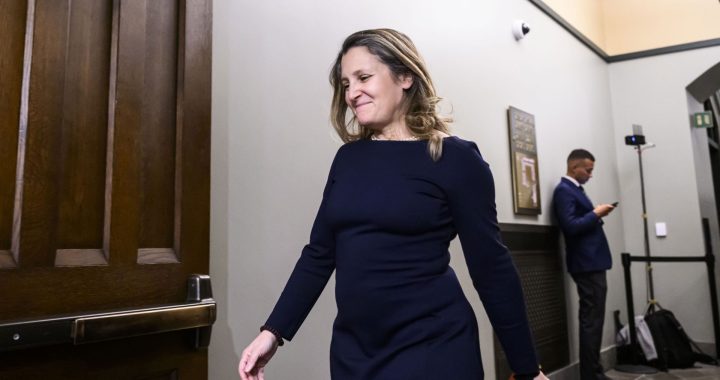APTN National News
The Liberal government of Justin Trudeau unveiled a federal budget Tuesday containing $8.4 billion worth of spending commitments to Indigenous communities across the country along with a pledge to undertake substantial on-reserve education reform and begin negotiations to establish a new fiscal relationship with First Nations.
The federal budget contained commitments to spend $4.2 billion on education, children and training, $1.2 billion on social infrastructure and $2.42 billion for green infrastructure over the next five years for First Nation, Inuit, Metis and Nothern communities.
Finance Minister Bill Morneau said his government began with the failed $5 billion Kelowna Accord as a baseline. He said this budget far exceeded funding commitments contained in the accord which died after the minority Liberal government of Paul Martin fell in the fall of 2005.
“One of the things I am most proud of in this budget is that we have decided to make very significant investments for Indigenous people in this country,” said Morneau, during a press conference Tuesday. “It’s significantly more than the Kelowna Accord.”
Morneau also reiterated his government’s commitment to continue collaboration with Indigenous peoples through an increase in funding contained in the budget for Aboriginal Representative Organizations.
“”We have also invested in enabling Indigenous people to have the funds required to represent themselves in discussions with the federal government so we can have an appropriate discussion that helps us get to better outcomes,” said Morneau.
Some of the highlights for Indigenous peoples and communities found in Morneau’s first federal budget include:
- $1.8 billion over five years for water and waste water infrastructure.
- $554.3 million over two years for on-reserve housing. The money will be split between Indigenous and Northern Affairs ($416 million) and Canada Mortgage and Housing ($137 million).
- $409 million over five years for on-reserve waste management to help First Nations near cities and towns redirect garbage to municipal landfills, improve recycling and to develop “properly engineered” landfills in remote communities.
- $270 million over five years for health facilities like nursing stations and residences for health care workers in First Nation communities.
- $255 million over two years for the First Nations Infrastructure Fund to pay for broadband connections, energy systems, bridges and other physical infrastructure needs.
- $177 million over two years for Inuit and Northern housing including $76 million for Nunavut, $50 million for Nunavik, $15 million for Nunatsiavut, $15 million for the Inuvialuit Settlement Region, $12 million for the Northwest Territories and $8 million for the Yukon.
- $141.7 million over five years to monitor on-reserve water quality and to track progress toward ending water boil advisories which currently afflict over 100 First Nation communities.
- $129.4 million in early learning and child care over the next two years.
- $96 million over five years for Aboriginal Representative Organizations like the Assembly of First Nations and Inuit Tapiriit Kanatami.
- $33.6 million over five years for on-reserve shelters for victims of family violence.
- $33.1 million this year for First Nation fishing enterprises on the Pacific and Atlantic coasts.
- $25 million for the Metis Nation economic development strategy.
- $5 million per year for support of Indigenous languages.
The budget document stated that by the 2020-2021 fiscal year total spending commitments contained in the budget would raise funding for Indigenous programs by 22 per cent above what would exist under the two per cent funding cap over the same time span.
The budget document also said the Liberal government would begin talks this year with First Nations on developing a new fiscal relationship.
The central piece of the budget is $3.7 billion committed for First Nation education, including new money for the classroom-level and for new schools, along with renovations to existing facilities.
The biggest single yearly investment for education infrastructure, $282 million, is earmarked to flow in 2017-2018 and the total will hit $969 million by 2020-2021.
The next federal election is scheduled for the fall of 2019.
The money for classroom level instruction, however, is back-ended with $1.4 billion of the total earmarked for the last two years of the five year outlook contained in the budget.
The Liberal government is also launching an $824 million “transformation” process to overhaul the on-reserve education system. The process will include consultations to “achieve meaningful gains in education outcomes.”
The 2016-2017 budget is also setting aside $40 million over the next two years for an inquiry into the high number of murdered and missing Indigenous women and girls.
On the child welfare front, the budget has earmarked $634 million over five years to “ensuring the safety and well-being of First Nations children.” However, only $71 million is slated to flow this year, growing to $99 million next year.
Indigenous Affairs will also receive $10.7 million from a separate pot of money to develop renewable energy projects for Indigenous and Northern communities that currently depend on diesel power generation.
The federal department will also receive $19 million over five years to collaborate with Inuit communities to bolster ongoing Arctic research with traditional knowledge. The work will be centred on potential oil and gas activity in the Kivalliq, Kitikmeot and Arctic Islands of Nunavut to determine whether these energy developments should “proceed in these regions.”
The federal budget contained no funds specifically set aside for consultation with First Nations on major natural resource projects. The document does earmark $16.5 million over three years for the National Energy Board, Natural Resources Canada and Transport Canada to support “public and Indigenous participation in enhanced consultations” for projects currently under review. The money would also be used for “Crown consultations with Indigenous peoples.”
The federal budget made no mention of the Liberal government’s commitments to implement all 94 of the Truth and Reconciliation Commission’s calls to action. A federal official said the Liberal government is currently consulting on the issue and would soon unveil its plan on implementing those recommendations.
@APTNNews










